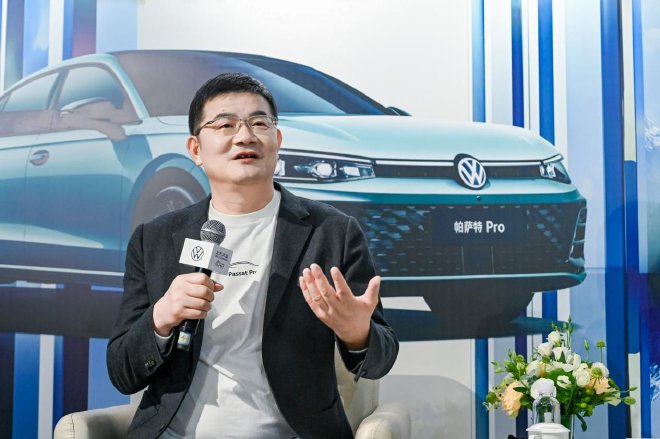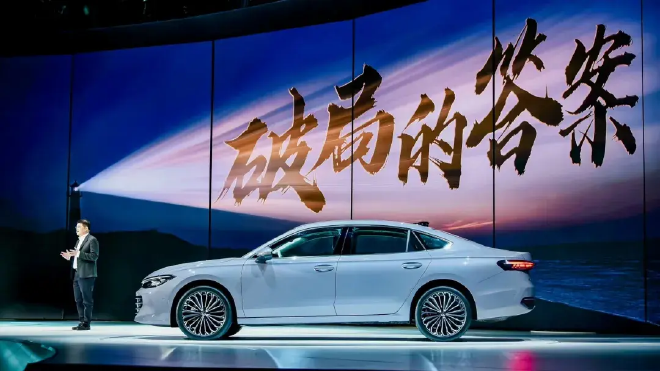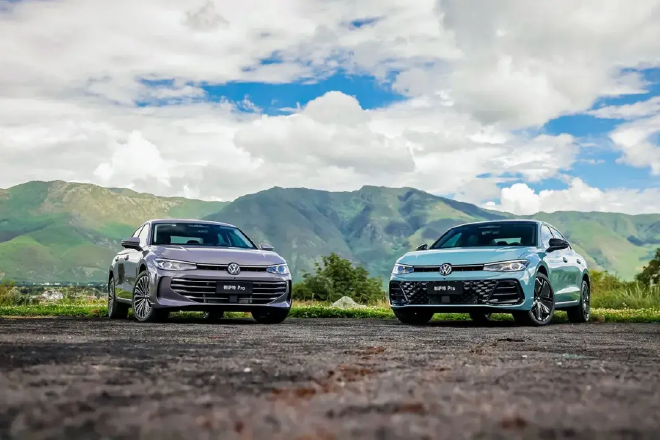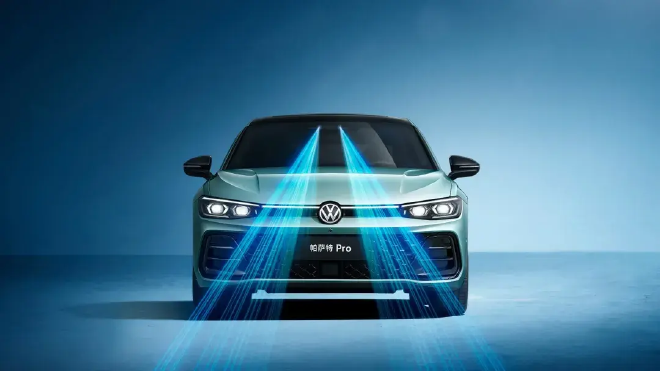After the release of the Tiguan L Pro, the Passat also underwent a “Pro” transformation. On September 10, the SAIC Volkswagen Passat Pro and the Passat 2025 launched together. They announced a limited-time price of 159,900 to 223,900 yuan (31550$), igniting enthusiasm in the mid-to-high-end sedan market. After the press conference, Tao Hailong, Secretary of the Party Committee and General Manager of SAIC Volkswagen, and Fu Qiang, Executive Vice President of Sales and Marketing, engaged in deep discussions with media, including Sina Auto, about the brand’s strategic adjustments and product planning.
Tao Hailong believes SAIC Volkswagen has a clear business and product strategy. The Chinese and German shareholders have laid a solid foundation. SAIC Volkswagen will follow market trends. It will continuously innovate its product lineup. The company aims to offer users choices at different price points and with various energy forms.
Fu Qiang stated that SAIC Volkswagen will launch the Pro trilogy. This means enhancing their already excellent products. They will also address shortcomings in intelligence and internet connectivity. This will push the entire brand upward. The strategy is clear and steady. It continuously elevates the brand. “We are not complacent. Given the current market situation, SAIC Volkswagen faces significant pressure. Our team must tread carefully and seize every moment to capture the market,” said Tao Hailong regarding the current market conditions. However, Tao remains optimistic about SAIC Volkswagen’s future. He acknowledged the risks but emphasized positive prospects. After taking over at SAIC Volkswagen, he spent over 50 days focusing on understanding the market. “After communicating with dealers and investors, market feedback has been very positive,” he said. He noted that SAIC Volkswagen’s products still hold competitive strength. In the fuel vehicle market, SAIC Volkswagen remains number one, and consumers highly accept their fuel vehicles. At the dealer level, Tao also provided a positive response. “Dealers have confidence in us. This is reflected in adjustments to sales strategies. We place great importance on dealers. They are our core competitiveness. SAIC Volkswagen focuses on relationships with our partners.” Notably, at the launch event for the SAIC Volkswagen Passat Pro family, Tao used “breaking the deadlock” as the theme of his speech. He systematically addressed the new management’s direction and approach.
In the interview, he stated, “SAIC Volkswagen will not pursue short-term gains. We must maintain our strategy without losing our composure. There is no need for SAIC Volkswagen to act otherwise.” He emphasized the need for transformation but insisted on a disciplined approach. He summarized his strategy: at the strategic level, continue the “In China for China” strategy and fully invest in the Chinese market. At the product level, the focus will be on continuous improvement and upgrades. Tao Hailong believes the shareholders have laid a strong foundation. The long-term cooperation between China and Germany has built a strategic consensus. In June, both sides signed multiple technical cooperation agreements for new products. This collaboration pools resources to empower joint ventures, enriching product features and enhancing innovation. Regarding products, SAIC Volkswagen plans to launch new offerings across various price ranges. “We have a comprehensive layout from A-segment to B-segment vehicles, not just one model but a series,” said Tao Hailong. Additionally, SAIC Volkswagen has a clear strategy for smart technology. Taohailong stated that the upcoming products will lead the market technically. With the quality of mass-market brands and their genetic advantages, SAIC Volkswagen will achieve differentiated competition. They will launch plug-in hybrid vehicles in 2026. In recent years, rapid electrification and intelligence have transformed the Chinese automotive market. The share of new energy vehicles in the passenger car sector has risen, while traditional fuel vehicles have lost market share. SAIC Volkswagen stands out as a leading domestic passenger car manufacturer. It has ranked among the top in production and sales for a long time. It previously achieved an annual output of 2 million vehicles. However, it now faces challenges in sales growth in the new energy vehicle era. In light of this situation, Taohailong, who has been in office for just over 50 days, shared his initial insights. He believes SAIC Volkswagen has a clear strategic direction. The shareholders have reached a unified strategic consensus. This consensus will manifest in product strategy, focusing on the product spectrum. Next, the Volkswagen brand will invest in both fuel and new energy vehicles. They will pursue simultaneous development, which can be understood as “doing addition.” Start from two directions. First, add to the product matrix. Second, enhance the product’s competitiveness.
SAIC Volkswagen has identified three Pro product families in its product matrix. The Tiguan Pro has already launched. The Passat Pro has also launched. Next is the Touareg Pro from the Touareg family. Tao Hailong stated, “In the future, SAIC Volkswagen will have a dense product layout in the 80,000 to 320,000 yuan (45100$) price range. Essentially, there will be one product for every 10,000 yuan (1410$).” In terms of product strength, SAIC Volkswagen aims to add value to its already excellent products. The Tiguan L Pro and Passat Pro exemplify this. The former positions itself as “the smartest fuel vehicle.” The latter enhances comfort and luxury, especially in the rear seat, making it nearly unmatched in the B-segment. Currently, the Pro products launch alongside existing models, forming a new product family and achieving greater market coverage. The additive strategy for the Tiguan L Pro shows clear results. Its monthly sales exceed 3,000 units, raising the entire Tiguan family’s monthly sales to around 14,000 units. Regarding the future sales performance of the Passat Pro, Tao Hailong provided an optimistic forecast. He noted, “The Passat Pro launched with a more aggressive pricing strategy. The current monthly sales for the Passat are about 20,000 units. With the new model’s launch, we expect new sales growth.” Through these actions, SAIC Volkswagen’s market share in the fuel vehicle segment has even risen. In July, SAIC Volkswagen’s market share was 7%. In August, it reached 8%, with further increases expected in September. Additionally, SAIC Volkswagen’s corporate strategy focuses on both fuel and electric vehicles. The ID series has also undergone product upgrades. These upgrades are not just cosmetic; they include enhancements in software and internal features. The company launched the smart versions of ID.3 and ID.4 X, featuring larger central screens and an updated software system, rapidly closing the gap with new competitors. Tao Hailong pointed out that the Volkswagen brand currently invests in both fuel and new energy vehicles. They pursue both gasoline and electric options. They also continuously invest in smart technology. SAIC Volkswagen adheres to a model that integrates gasoline, electric, and hybrid technologies across all markets. According to their plan, SAIC Volkswagen develops three plug-in hybrid models and two new pure electric models. They expect to launch several jointly developed plug-in hybrid and pure electric models from 2026 to 2030. Cost reduction and efficiency improvement, along with addressing smart technology gaps, will support a major comeback. At the Chengdu Auto Show, Fu Qiang stated, “If a joint venture car company chooses to lie flat, it will never stand up again. Therefore, offense will be SAIC Volkswagen’s only strategy. This choice will temporarily sacrifice some profits during the transition but will win the future.” The Passat Pro currently signals SAIC Volkswagen’s offensive. Regarding the major comeback, Tao Hailong emphasized the urgent need to reduce costs and enhance competitiveness while addressing software deficiencies. He said, “In a highly competitive environment, cost becomes even more important. SAIC Volkswagen has already stated that it aims to make plug-in hybrid products competitive with domestic brands in terms of cost.” As a quality assurance professional, Tao Hailong emphasizes maintaining quality while pushing for cost reductions. He stated, “There are many ways to control costs, but a crucial prerequisite for cost reduction is that quality must not suffer. I repeatedly emphasize the need to protect the brand and adhere to Volkswagen’s standards and quality.” Additionally, Tao Hailong denied rumors about a 2 billion cost reduction upon his appointment. He stated that efficiency is the key to cost reduction, and all aspects of operational and investment efficiency must improve.
SAIC Volkswagen focuses on the intelligence of fuel vehicles. Fu Qiang states, “The market has moved away from traditional energy, but we see opportunities. If we can enhance the intelligence of fuel vehicles, it creates a blue ocean market. We started developing such products two to three years ago.” He cites SAIC Volkswagen’s Pro products. The “Pro” signifies improvements in intelligence and connectivity, building on already strong mechanical performance. Fu emphasizes that a vehicle’s “smartness” does not depend on its energy source. In some ways, traditional energy may be smarter due to its complex controls. SAIC Volkswagen rapidly advances in internet connectivity and intelligence, especially in smart cockpits and smart driving, closing the gap visibly. He reveals that SAIC Volkswagen will continue investing, particularly in software upgrades, not just in smart driving. “We must maintain our focus on fuel vehicles, but we cannot be conservative. We will continue with hybrids and electric vehicles, and we will push for further intelligence,” says Tao Hailong. In summary, as Tao Hailong states, “SAIC Volkswagen aims to enhance product quality while aligning with industry trends. We will advance both fuel and electric vehicles and accelerate intelligent product iterations to meet diverse user needs.” Clearly, the launch of the Passat Pro marks SAIC Volkswagen’s initial layout for “intelligent fuel vehicles” in both the SUV and sedan markets. The dual-car strategy signals the acceleration of the entire product line’s “intelligent” strategy. This reflects SAIC Volkswagen’s strategic foresight and ongoing product innovation. We look forward to more Pro-level products from SAIC Volkswagen for domestic consumers, achieving true “intelligent fuel and electric vehicles.”




